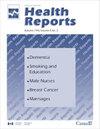在COVID-19大流行期间,有孩子和没有孩子的加拿大成年人慢性疾病风险因素和当前运动习惯的变化
IF 3.3
2区 医学
Q2 PUBLIC, ENVIRONMENTAL & OCCUPATIONAL HEALTH
引用次数: 1
摘要
加拿大人受到了COVID-19大流行的严重影响,与儿童一起生活的成年人可能受到了不成比例的影响。本研究的目的是描述有或没有18岁以下儿童的成年人慢性疾病风险因素和当前运动习惯的变化。数据和方法采用加拿大视角调查系列(CPSS)于2020年3月下旬(CPSS1, N= 4383)、5月初(CPSS2, N= 4367)和7月中旬(CPSS4, N= 4050)收集的15岁及以上加拿大人的数据进行重复横断面研究。这项分析包括25岁及以上的参与者。在2020年的三个时间点,参与者报告了他们是增加、减少还是没有改变他们对酒精、烟草、垃圾食品或糖果的消费,他们的屏幕使用情况,以及他们目前是在室内还是室外锻炼。比较有孩子和没有孩子的成年人的行为,并使用逻辑回归估计未调整的优势比(OR)和95%置信区间(CI)。结果:在所有三个时间点,有孩子的家庭饮酒增加(与减少或没有变化相比)、在CPSS1 (or: 1.69, 95% CI: 1.09-2.60)、在CPSS1 (or: 1.59, 95% CI: 1.05-2.41)和CPSS4 (or: 1.56, 95% CI: 1.05-2.29)时消费垃圾食品和糖果的几率更高。与老年人(55岁及以上)相比,年轻人(25岁至54岁)更有可能表现出慢性病风险因素的增加,而不管家庭中是否有孩子。很大一部分加拿大成年人报告说,在大流行期间,慢性病风险因素增加,与没有孩子的成年人相比,有孩子的成年人的风险增加幅度更大。迫切需要采取公共卫生干预措施,以减轻这一大流行病对人口健康的长期影响。本文章由计算机程序翻译,如有差异,请以英文原文为准。
Changes in chronic disease risk factors and current exercise habits among Canadian adults living with and without a child during the COVID-19 pandemic.
Background
Canadians have been gravely impacted by the COVID-19 pandemic, and adults living with children may have been disproportionately impacted. The objective of this study was to describe changes in chronic disease risk factors and current exercise habits among adults living with and without a child younger than 18 years old.
Data and Methods
A repeated cross-sectional study was conducted using data collected from Canadians aged 15 and older via the Canadian Perspective Survey Series (CPSS) in late March (CPSS1, N=4,383), early May (CPSS2, N=4,367) and mid-July 2020 (CPSS4, N=4,050). This analysis included participants aged 25 and older. At three points during 2020, participants reported whether they increased, decreased, or had not changed their consumption of alcohol, tobacco and junk food or sweets, their screen use, and whether they currently exercised indoors or outdoors. Behaviours were compared for adults living with and without a child, and unadjusted odds ratios (OR) and 95% confidence intervals (CI) were estimated using logistic regression.
Results
The presence of a child in the household was associated with higher odds of increased (compared with decreased or no change) alcohol consumption at all three time points, consumption of junk food and sweets at CPSS1 (OR: 1.69, 95% CI: 1.09-2.60), and time on the Internet at CPSS1 (OR: 1.59, 95% CI: 1.05-2.41) and CPSS4 (OR: 1.56, 95% CI: 1.05-2.29). Compared with older adults (aged 55 and older), younger adults (aged 25 to 54) were more likely to exhibit increases in chronic disease risk factors regardless of the presence of a child in the household.
Interpretation
A substantial proportion of Canadian adults reported increased chronic disease risk factors during the pandemic, with greater increases noted among adults living with a child, compared with those living without a child. Public health interventions are urgently needed to mitigate the long-term impact of the pandemic on population health.
求助全文
通过发布文献求助,成功后即可免费获取论文全文。
去求助
来源期刊

Health Reports
PUBLIC, ENVIRONMENTAL & OCCUPATIONAL HEALTH-
CiteScore
7.30
自引率
4.00%
发文量
28
期刊介绍:
Health Reports publishes original research on diverse topics related to understanding and improving the health of populations and the delivery of health care. We publish studies based on analyses of Canadian national/provincial representative surveys or Canadian national/provincial administrative databases, as well as results of international comparative health research. Health Reports encourages the sharing of methodological information among those engaged in the analysis of health surveys or administrative databases. Use of the most current data available is advised for all submissions.
 求助内容:
求助内容: 应助结果提醒方式:
应助结果提醒方式:


